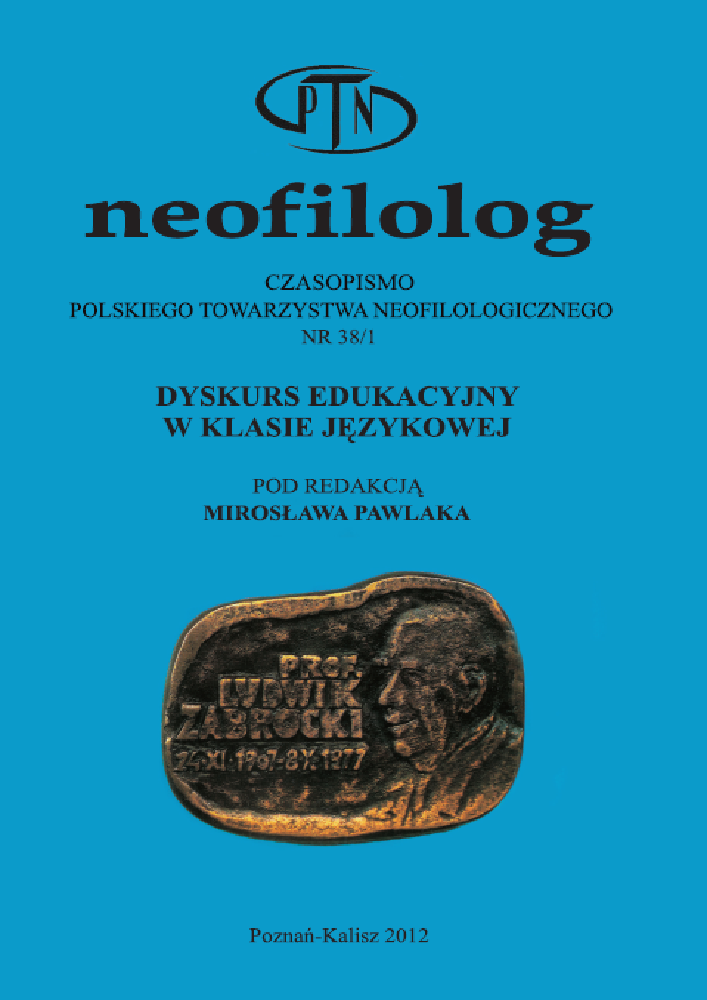Abstrakt
This article attempts to persuade the reader that in order to prepare our learners for using foreign languages (FL) efficiently in the global, multicultural world, FL pedagogy needs to reconsider its long-established goals of teaching and adopt a more openended, intercultural (IC), processoriented approach. Thus, the objective of language training, apart from the traditional work on the four skills, should be raising awareness of difference and diversity between representatives of various cultures and engaging learners in the process of decentering, acquiring desirable attitudes to otherness, fostering empathy, developing their ability to mediate, promoting tolerance, and benefiting rather than suffering from IC experience. The dialogic approach, which will be discussed in the paper, seems to be tailormade to achieve this. In the empirical part of the article, the author reports the results of qualitative research which involved observations of English lessons in several high schools in Poznań, Poland. The study aimed at answering the questions whether and to what degree a homogeneous FL classroom in Poland is conducive to developing IC sensitivity and competence. The results demonstrate that IC dialogue plays a marginal role and teachers do not engage learners in discussion, analysis or reflection about the interrelationships between language, identity, culture and communication. If culture appears in the classroom, it is taught in a very traditional way, namely it is limited mostly to transferring declarative knowledge about various aspects of foreign culture/s.
Bibliografia
Aleksandrowicz-Pędich, L. 2005. Między kulturowość na lekcjach języków obcych. Białystok: Wydawnictwo Uniwersytetu w Białymstoku.
Byram, M. i Morgan, C. 1994. Teaching and learning language and culture. Clevedon, OH: Multilingual Matters.
Byram, M. 1997. Teaching and assessing intercultural communicative competence. Clevedon, UK: Multilingual Matters.
Byram, M. 2008. From foreign language Education to education for intercultural âti^enship. Essays and reflections. Clevedon, UK: Multilingual Matters.
Byram, M. i Zarate, G. 1996. Młodość wobec różnic. Propozycje dla nauczycieli. Warszawa: Fundacja Edukacja dla Demokracji.
Corbett, J. 2003. An intercultural approach to English language teaching. Clevedon, UK: Multilingual Matters.
Cortazzi, M. 1999. „Cultural mirrors: materials and methods in the EFL classroom", [w:] Hinkel, E. (red.). Culture in second language teaching and learning. Cambridge: Cambridge University Press. 196-219.
Fermer, A. 2000. „Cultural awareness", [w:] Fenner, A. i Newby, D. (red.). Approaches to mateńals design in European textbooks. ECML: Council of Europe. 142-155.
Forsman, L. 2010. „EFL education in the new millennium: focus on the promotion of awareness of difference and diversity", [w:] Scandinavian Journal of Education Research 54: 501-517.
Habermas, J. 1999. Teoria działania komunikacyjnego. Warszawa: Wydawnictwo Naukowe PWN.
Kelly, G. 1955. The psychology of personal constructs. New York: Norton.
Kohonen, V., Jaatinen, R., Kaikkonen, P. i Lehtovaara, J. 2001. Expenential learning in foreign language education. London: Longman.
Krams ch, C. 1993. Context and culture in language teaching. Oxford: Oxford University Press.
Lingard, L. i Kennedy, T. J. 2007. Qualitative research in medical education. Edinburgh: ASME.
Pilch, T. 1998. Zasady badań pedagogicznych. Warszawa: Żak.
Risager, K. 1991. „Cultural references in European textbooks: An evaluation of recent tendencies", [w:] Buttjes, D. i Byram, M. (red.). Mediating languages and cultures: Towards an intercultural theory of foreign language education. Clevedon, UK: Multilingual Matters. 181-192.
Roberts, C, Byram, M., Barro, A., Jordan, S. i Street, B. 2001. Eanguage learners as ethnographers. Clevedon, UK: Multilingual Matters.
Rogers, C. R. 1969. Freedom to learn. Columbus, Ohio: Charles Merrill.
Scollon, S. 1999. „Confucian and Socratic discourse in the tertiary classroom", [w:] Hinkel, E. (red.). Culture in second language teaching and learning. Cambridge: Cambridge University Press. 13-27.
Sercu, L. 1998. „In-service teacher training and the acquisition of intercultural competence", [w:] Byram, M. i Fleming, M. (red.). Language learning in intercultural perspective. Approaches through drama and ethnography. Cambridge: Cambridge University Press. 255-274.
Seidlhofer, B. 2010. „Giving voice to English as a lingua franca", [w:] Facchinetti, R., Crystal, D. i Seidlhofer, B. (red.). From international to local English and back again. Bern: Peter Lang: 132-156.
Silverman, D. 2011. Interpreting qualitative data: a guide to the principles of qualitative research, (wydanie czwarte). Los Angeles: Sage.
Tarnowski, K. 2005. Usłyszeć niewidzialne. Zarys filozofii wiary. Kraków: Instytut Myśli Józefa Tischnera.
Thompson, C. 2011. „A dialogic approach to the design of a transcultural communication classroom activity for multilingual learners", [w:] Language, Culture <& Curriculum 24: 207-220.
Williams, M. i Burden, R. 1997. Psychology for language teachers. Cambridge: Cambridge University Press.
Licencja
Prawa autorskie (c) 1970 Paweł Sobkowiak

Utwór dostępny jest na licencji Creative Commons Uznanie autorstwa – Bez utworów zależnych 4.0 Międzynarodowe.
Przedstawiany utwór (artykuł) upubliczniany jest na podstawie umowy z autorem i na licencji Creative Commons Attribution-NoDerivatives 4.0 International (CC BY-ND 4.0).
Użytkownicy mają obowiązek podania wraz z rozpowszechnionym utworem, informacji o autorstwie, tytule, źródle (odnośniki do oryginalnego utworu, DOI) oraz samej licencji;
- bez tworzenia utworów zależnych,
- utwór musi być zachowany w oryginalnej postaci.
Uniwersytet im. Adama Mickiewicza w Poznaniu zachowuje prawo do czasopisma jako całości (układ, forma graficzna, tytuł, projekt okładki, logo itp.).
